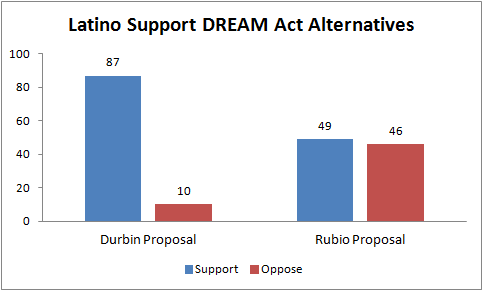
MIAMI – The vast majority of people in the United States support the DREAM Act, and they just as strongly prefer it over the vague proposals put forward as an alternative by the tea party’s only Latino star, Sen. Marco Rubio, R-Fla.
This information, released June 8, came from a poll conducted by Latino Decisions.
The bipartisan Development, Relief, and Education for Alien Minors (DREAM) Act, first introduced by Sen. Dick Durbin, D-Ill., and Orrin Hatch, R-Utah, in 2001, would allow a path to citizenship for undocumented immigrants who came to the U.S. as minors and show good moral character. It came close to passing into law at the end of 2010, just before the Republican Party took control of the House of Representatives.
President Obama has vowed that he would sign the act into law were it to reach his desk. He in fact lobbied for it as it made its way through the Congress in 2010.
GOP presidential candidate Mitt Romney opposes the DREAM Act, as do most members of his party, but Sen. Rubio, his potential running mate, has said he would introduce alternative legislation. Rubio’s plan, sometimes referred to as DREAM Act-lite, is vaguely defined, but would likely include most of the provisions of the DREAM Act – though minus the key provision: a path to citizenship.
According to the Latino Decisions poll, a whopping 87 percent of Latinos surveyed support the DREAM Act, while only 10 percent oppose it. But Rubio’s proposals scored half that, with only 49 percent approval amongst Latinos, and 46 percent disapproval.
This represents a numerical victory for DREAM Act supporters, but is significant in another way as well. Opponents of immigration reform have attempted to divide native-born, documented, and undocumented Latinos over the issue. The results of the poll show a general consensus in the community.
The poll, which has a 3.9 percentage point margin of error for Latinos and 4.4 points for others, seems to undercut right-wing hopes that racism from whites and other non-Latinos would undermine support for the proposed law. The organization found that 62 percent of non-Latinos support the DREAM Act, while 33 percent oppose it. Their support for the Rubio proposal was nearly the same as that of the Latino community: 47 to 44 percent.
When asked which proposal they support more, 82 percent of Latinos said they supported the DREAM Act, over 13 for the Rubio alternative. For non-Latinos, the numbers were 61 percent and 27 percent, respectively.
Public support for the non-Rubio version remains “broad-based and popular,” the polling firm said. According to Latino Decisions, “[M]ultiple polls on the topic of immigration reform for undocumented youth have found only a small minority of the American public is opposed to a path towards citizenship for DREAM-eligible youth.” The firm went on to cite a Fox News poll showing that a majority of Republicans, and 70 percent of Arizonans, support the act.
While the public supports the DREAM Act, activists are continuing to fight for it.
Although it is promising to support immigration reform, Obama’s administration has backed some of the harshest-ever crackdowns on undocumented immigrants.
Undocumented young people in Miami and their allies are planning a demonstration Wednesday to demand Obama end the crackdown.
“We took the first step in helping our peers to have a right to dream and study. Obama, it’s your turn to act!” said Julio Calderon, a student leader helping to organize the Miami rally. “All our efforts will be lost if the president keeps deporting DREAMers in record numbers. We are asking Obama to stop the deportations of immigrant youth; it is in his hands.”
Still, supporters find Obama far more favorable to reform than candidate Romney, and many DREAM Act advocates continue to see Obama as an ally. “[W]e need to pass the DREAM Act,” Obama said in a 2011 speech in El Paso, Texas. “Now, we passed the DREAM Act through the House last year when Democrats were in control. But even though it received a majority of votes in the Senate, it was blocked when several Republicans who had previously supported the DREAM Act voted no.”
“That was a tremendous disappointment to get so close and then see politics get in the way,” Obama continued. “And as I gave that commencement at Miami Dade [College], it broke my heart knowing that a number of those promising, bright students – young people who worked so hard and who speak about what’s best in America – are at risk of facing the agony of deportation. These are kids who grew up in this country. They love this country. They know no other place to call home. The idea that we’d punish them is cruel. It makes no sense.”
Photo via Latino Decisions.










